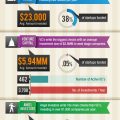How Start-Ups Are Valuated – This Is How You Can Evaluate Your Starting Company
Most of the biggest online companies that exist today – Google, Yahoo, Facebook, eBay, you name it…, probably wouldn’t be here, if they didn’t receive venture capital or angel financing at their beginning. But putting money into a business is the easiest part, accurately evaluating its potential is what makes the difference between a highly successful and a bad investment. Investing in a multi-billion company at its start is like hitting the jackpot. All of the early investors in Google have made millions and even billions (like Andreas von Bechtolsheim for instance). But spotting such a gold mine is not that easy. In the following infographic, created by the start-up organization ‘Founders and Founders’, you can see how venture companies evaluate the start-ups they finance. Although there are no guarantees, there are definitely certain things one should pay attention to when putting money into someone’s business:
 The Magic of Accurately Valuating a Start-Up, Author: www.foundersandfounders.com
The Magic of Accurately Valuating a Start-Up, Author: www.foundersandfounders.com
The valuation of a startup is a complex process that relies on both quantitative and qualitative factors. For instance, investors will assess the size of the potential market opportunity, the team’s capabilities, their track record, the potential of the technology, and any competitive advantages that the startup may have.
In general, startup valuation is based on a number of different financial indicators and metrics. This includes the estimated value of the company’s assets, its revenue and cash flow, and the degree of risk posed by the venture. Other factors taken into consideration are the amount of capital invested, the size of the market that the company is targeting, the company’s competitive advantages and growth potential, and the level of experience of the management team.
Some startup valuation methods include the Discounted Cash Flow (DCF) model, Comparable Company Analysis (CCA), and the Risk Factor Summation (RFS) model. The DCF method is a common way to assess a company’s overall financial value. The DCF approach values a firm by calculating the present value of its future cash flows.
The CCA method involves comparing the target company with similar businesses and comparing their respective enterprise values. The RFS approach is used to estimate the cost of capital by taking into account the risk associated with the investment.
The approach that is used to value a startup depends on a variety of factors, including the stage of development of the business, the type of company, and the goals and objectives of the valuation analysis. Ultimately, the valuation process can be complex and requires an experienced team of professionals.
Startup valuations are critical, as they provide investors with the confidence needed to make decisions on whether to invest in or even exit from, the company. In order to determine the economic value of a business concept, startups often hire experienced valuation professionals who can look at all of the available data and determine a fair market value.
Please, go press the social buttons if you enjoyed this post, thank you!


